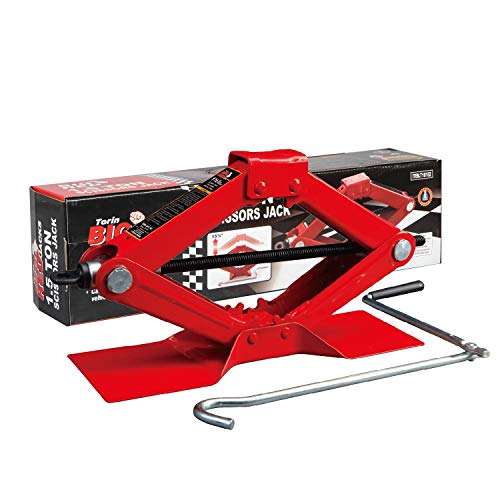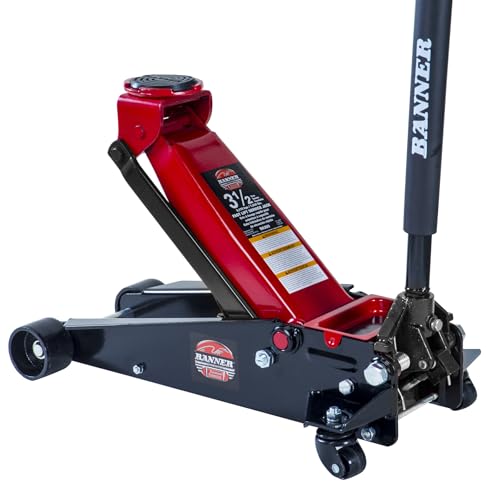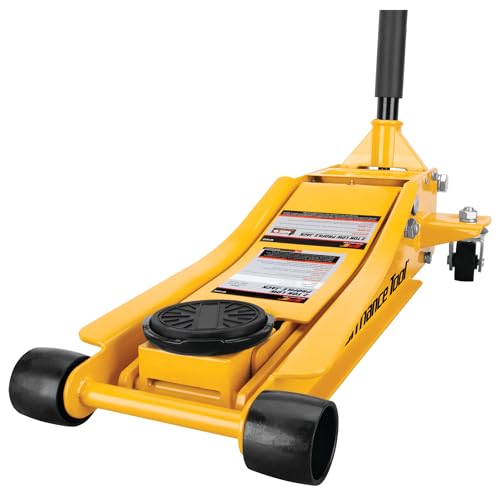Working on your car at home requires the right tools, and a reliable floor jack is arguably the most critical piece of equipment for any garage. Whether you’re performing routine maintenance like oil changes and tire rotations or tackling more complex repairs, a quality jack provides the safety and stability needed to lift your vehicle with confidence. The wrong choice can lead to frustration, wasted time, and even dangerous situations.
With so many models on the market, selecting the perfect floor jack for your needs and vehicle types can be a challenge. This roundup simplifies your search by highlighting ten of the best options available. We have considered factors like lifting capacity, low-profile design for modern cars, construction quality, and unique features to help you make an informed decision for your home workshop.
Our Top Picks for Garage Floor Jacks
- Maxority 3-Ton Low Profile Hydraulic Floor Jack
- BIG RED 2.5 Ton Low Profile Hydraulic Trolly Jack
- Pittsburgh Automotive 3 Ton Ultra Low Profile Steel Floor Jack
- BIG RED Torin Steel Scissor Lift Jack Car Kit
- Daytona 3 Ton Professional Rapid Pump Floor Jack
- Pro-Lift F-767 Grey Low Profile Floor Jack
- Blackhawk B6350 Fast Lift Service Jack
- OTC 3-Ton Service Jack
- Performance Tool W1642 Professional Low-Profile Floor Jack
- Arcan ALJ3T Aluminum Floor Jack
Maxority 3-Ton Low Profile Hydraulic Floor Jack

For enthusiasts with sports cars or lowered vehicles, the Maxority 3-Ton floor jack is an excellent solution. Its extended reach and ultra-low profile design allow it to slide under vehicles with minimal ground clearance, a common challenge with standard jacks. This makes it a versatile tool for a wide range of cars, including those with aftermarket modifications.
A key feature is the RAPID PUMP technology, which utilizes a high-speed hydraulic system. This design allows for quick lifting with fewer pump strokes, saving you significant time and effort during maintenance tasks. The dual-piston construction and heavy-duty steel build provide the durability and stability needed for reliable 3-ton performance in a home garage setting.
BIG RED 2.5 Ton Low Profile Hydraulic Trolly Jack

The BIG RED 2.5 Ton jack offers a fantastic balance of capability and value for the home mechanic. With an ultra-low minimum lift height, it can easily access low-profile racing cars and everyday sedans, while still providing a maximum height suitable for many SUVs. This wide application range makes it a great single-jack solution for households with multiple vehicle types.
Safety is a core focus of this model. It includes a built-in safety valve that provides overload protection, and a safety bypass system that prevents overloading to ensure secure operation. The rust-resistant construction is another benefit, helping to maintain the jack’s integrity and appearance over years of use in a garage environment.
Pittsburgh Automotive 3 Ton Ultra Low Profile Steel Floor Jack

A well-known name in home garages, the Pittsburgh Automotive 3-Ton jack is built with a heavy-duty, all-welded steel construction. This robust design ensures it can handle the demands of lifting vehicles like trucks and SUVs with a 6,000-pound capacity. Its lifting range is particularly useful, starting at a low 5 inches and reaching up to 18-1/4 inches.
User convenience is highlighted by the rapid pump quick lift system, which gets the saddle to the vehicle’s lift point efficiently. When it’s time to lower the vehicle, the process is equally simple, requiring just a half-turn of the release handle for precise and controlled descent. This combination of strength and ease-of-use makes it a perennial favorite.
BIG RED Torin Steel Scissor Lift Jack Car Kit

The BIG RED Torin Scissor Jack takes a different approach, offering a compact and highly portable solution. Its collapsible, steel scissor design makes it an ideal choice for storing in your car’s trunk as a reliable replacement for the factory jack. It’s also a great extra utility jack for the garage when you need a second lift point for stabilization.
Despite its compact size, it doesn’t compromise on strength. The jack is engineered with a drop-forged alloyed steel construction, providing quality and durability for its 1.5-ton (3,000 lb) capacity. With a lifting range from just over 4 inches to over 15 inches, it provides ample height for most roadside tire changes or light garage work.
Daytona 3 Ton Professional Rapid Pump Floor Jack

The Daytona 3-Ton Professional jack is designed for those who seek performance and durability. It features a robust lift capacity of 6,000 pounds, making it capable of handling a wide array of vehicles, from low-profile cars to larger trucks and SUVs. The lift range from 5 inches to 18-1/4 inches adds to its versatility in a home workshop.
Maneuverability is a strong point, thanks to the premium ball bearing rear swivel casters that allow for 360-degree mobility. This makes it easy to position the jack precisely under the vehicle’s lift point. Combined with its rapid pump mechanism for quick lifting, this jack offers a professional-grade feel for the serious DIYer.
Pro-Lift F-767 Grey Low Profile Floor Jack

The Pro-Lift F-767 is a solid 2-ton capacity jack that emphasizes safety and accessibility. Its extra-low profile is a key feature, with a minimum saddle height of just 3-3/8 inches, allowing it to fit under even the most challenging low-clearance vehicles. The solid steel construction provides a stable and reliable foundation for lifting.
Safety is integrated into its design with a patented bypass device that protects against over-pumping, a common user error. This, along with the safety release valve, ensures that operations remain within safe parameters. For a budget-friendly low-profile jack that doesn’t cut corners on essential safety features, the Pro-Lift is a strong contender.
Blackhawk B6350 Fast Lift Service Jack

If you need to lift heavier vehicles, the Blackhawk B6350 offers an impressive 3.5-ton (7,000 lb) capacity. This makes it suitable for larger sedans, trucks, and SUVs that might be at the upper limit of standard 2 or 3-ton jacks. The “Fast Lift” name indicates a pumping mechanism designed for quick engagement and lifting.
User safety and convenience are addressed with an internal safety valve and a vent plug that ensures consistent operation. The swivel saddle is another practical feature, providing easy jack positioning and helping to prevent damage to the vehicle’s frame during contact. It’s a heavy-duty workhorse built for demanding tasks.
OTC 3-Ton Service Jack

The OTC 3-Ton Service Jack stands out for its commitment to verified safety and long-term reliability. This jack meets all five ASME PASE-2019 safety standards for service jacks, providing extra peace of mind that it has been designed and built to rigorous industry criteria. This is a significant factor for those who prioritize safety above all else.
Backing this confidence is a limited lifetime warranty from OTC, a brand known for its professional-grade tools. This warranty reflects the manufacturer’s belief in the product’s durability and performance. For a home mechanic looking for a “buy it for life” tool from a trusted name, the OTC jack is a compelling option.
Performance Tool W1642 Professional Low-Profile Floor Jack

The Performance Tool W1642 offers an exceptional lifting range that sets it apart. It starts at an incredibly low 2-3/4 inches, making it one of the best options for vehicles with extremely low ground clearance. It then extends all the way up to 20 inches, providing more than enough height for most repair and maintenance jobs.
This 2-ton capacity jack is a universal fit, designed to work with a wide variety of vehicles. The combination of its ultra-low minimum height and high maximum lift makes it incredibly versatile, eliminating the need for multiple jacks or additional blocking to reach the vehicle’s frame.
Arcan ALJ3T Aluminum Floor Jack
For those who value easy handling and portability, the Arcan ALJ3T Aluminum Floor Jack is an excellent choice. Constructed from aluminum, this jack is significantly lighter than its steel counterparts, making it much easier to move around the garage or carry to a different location without sacrificing strength.
Despite its lightweight design, it maintains a solid 3-ton lifting capacity, suitable for most cars and light trucks. The low-profile design ensures it can handle modern vehicles with ease. If you frequently need to move your jack or simply prefer a less cumbersome tool, the weight savings of an aluminum model like the Arcan are a major advantage.
Buying Guide: How to Pick the Right Floor Jack for Your Home Garage
Choosing a floor jack for your home garage isn’t about getting the biggest, most expensive one. It’s about finding the right tool for the jobs you actually do. I’ve used my fair share of jacks over the years, and I’ve learned what really matters when you’re under a car. Let’s break down the key things to think about before you spend your money.
First up is weight capacity. This is the maximum weight the jack can safely lift. For most sedans and smaller SUVs, a 2-ton (4,000 lb) jack is plenty. But if you’re working on a larger truck or SUV, you’ll want to step up to a 3-ton (6,000 lb) model. My rule of thumb is to always get a jack with a capacity higher than your vehicle’s gross vehicle weight. It’s a simple safety margin that gives me peace of mind. Remember, the weight is on the jack for a short time while you position jack stands, which is a non-negotiable safety step.
Next, consider the lift range. This includes the minimum saddle height and the maximum lift height. A low minimum height is crucial for sports cars or any vehicle with low ground clearance. You need to be able to slide the jack under the lift point. The maximum height determines how high you can raise the vehicle. If you plan on doing work that requires a lot of room, like dropping a transmission, you’ll need a jack with a higher maximum lift. Pay close attention to this spec.
Then there’s the jack’s construction. Steel jacks are the classic, heavy-duty workhorses. They’re incredibly durable but can be very heavy to move around. Aluminum or “racing” jacks are much lighter and easier to maneuver, which is a huge plus if you’re constantly pulling it in and out of storage, but they often come with a higher price tag. Think about how often you’ll be moving it and where you’ll store it.
Finally, don’t overlook the little things. How many pump strokes does it take to reach the maximum height? A jack that lifts quickly with fewer pumps saves time and effort. Look at the handle design—is it comfortable and does it allow for good leverage? Also, check the quality of the wheels and casters. Good, rolling casters make positioning the jack a breeze, especially on slightly uneven garage concrete. Taking the time to consider these factors will help you find one of the best floor jacks for home garages that fits your specific needs and budget.
FAQ
What is the difference between a floor jack and a bottle jack?
The main difference is the design and how they’re used. A floor jack is long and low, lying flat on the ground. It has a long handle and wheels, so you can easily roll it under your vehicle. This makes it my go-to for most garage work because it’s so versatile and easy to position. A bottle jack is more compact and upright, like a cylinder. It’s great for its raw lifting power in a small package, but it often needs a lot of clearance to fit under a car and can be less stable than a good floor jack. For general home garage use, a floor jack is usually the more practical choice.
Are cheap floor jacks safe to use?
This is a really important question. While you don’t need to buy the most expensive professional-grade model, you should be very cautious with extremely cheap, no-name jacks. Your safety and the safety of your vehicle depend on this tool. I look for jacks that meet or exceed the ASME PASE safety standard. Always, and I mean always, use jack stands to support the vehicle once it’s lifted. The floor jack is only for lifting; the jack stands are for holding the weight while you work. A cheap jack might fail, but proper jack stands are your final, reliable safety net.
How do I find the lift points on my car?
This is a critical step that you should never guess on. The best place to find the correct lift points is in your vehicle’s owner’s manual. It will have diagrams showing the specific reinforced points on the frame or unibody designed to handle the jack’s pressure. Often, you can also look for notches or marked sections along the side sills (just behind the front wheels and ahead of the rear wheels). Lifting from the wrong spot, like the body panels or suspension components, can cause serious and expensive damage to your car. When in doubt, check the manual.
Can I use a floor jack on gravel or dirt?
I strongly advise against it. Floor jacks need a firm, level, and solid surface like concrete or asphalt to operate safely and stably. Using one on gravel, dirt, or even grass is dangerous. The base can sink, shift, or tilt, causing the jack to fail and the vehicle to fall. If you must work on an unpaved surface, you should use a large, solid piece of plywood or a specially designed jack pad under the jack to distribute the load and create a stable base. For most home mechanics, sticking to the garage floor is the safest bet.
Why is my floor jack not lifting, or lifting slowly?
This is a common issue that usually points to a few things. First, check the hydraulic fluid level. Over time, seals can wear and fluid can leak out or degrade. Topping it off with the correct hydraulic jack oil can often solve the problem. If that doesn’t work, there might be air trapped in the hydraulic system, which requires a process called “bleeding” to remove. You can usually find instructions for this in the jack’s manual. If it’s still not working, the internal seals might be worn out and need replacement, or the release valve might be faulty. For an older or heavily used jack, it might be time to start looking for a new one.